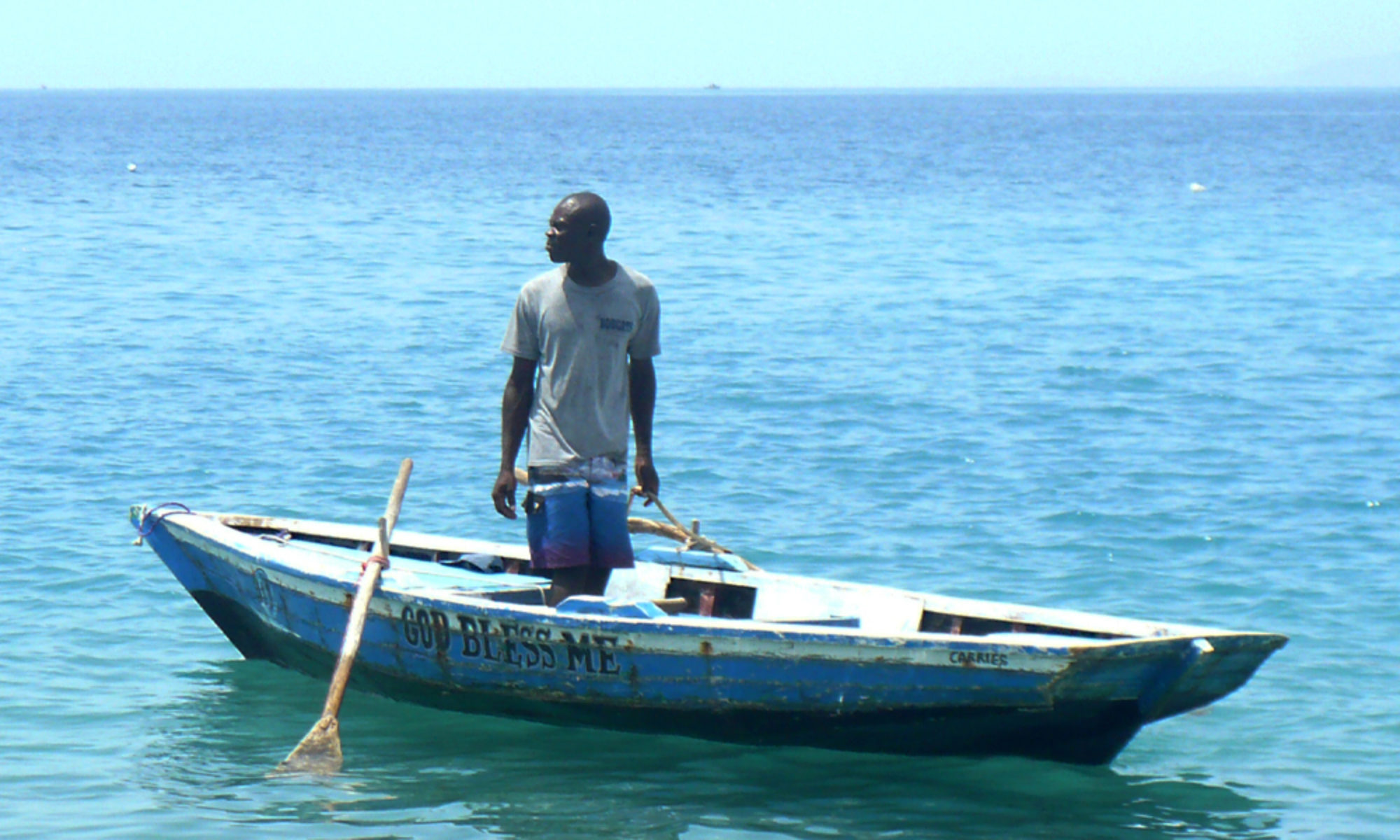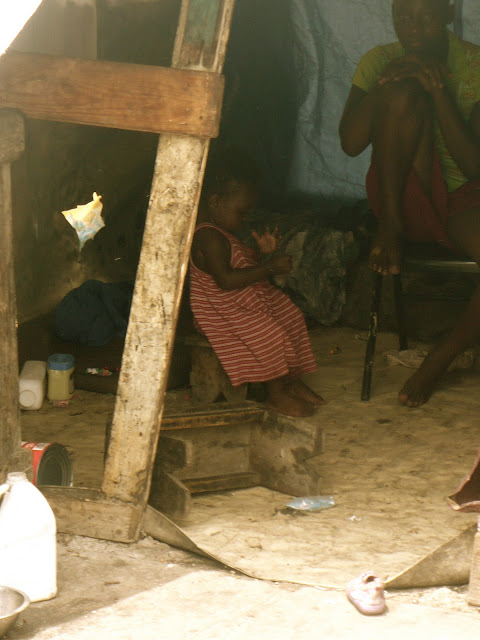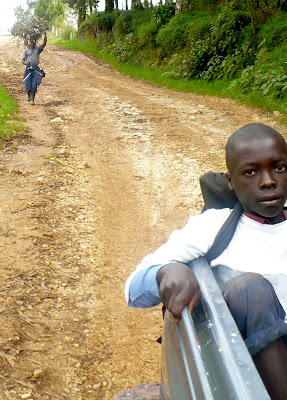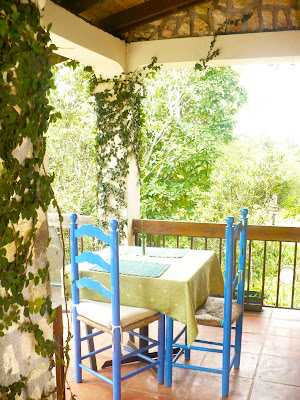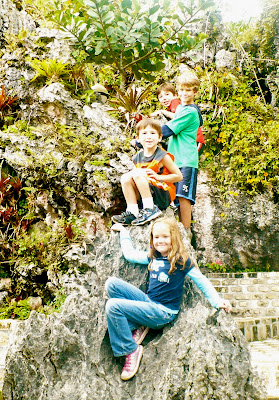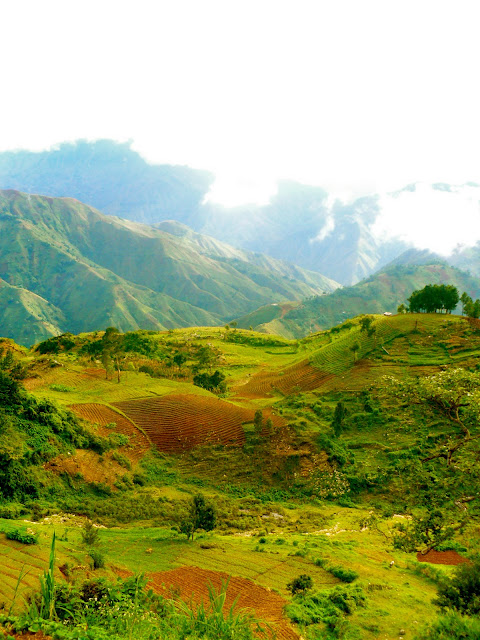*Double posting from our adoption blog since this post contains issues we struggle through living in Haiti as well as adoption issues.
“Defend the cause of the weak and fatherless;
maintain the rights of the poor and oppressed.”
Psalm 82:3
I once had a conversation with someone who had every good intention in supporting an orphange here in Haiti, but who was afraid to ask the necessary questions related to the accountabilty of support already received. This person truly wanted to help the children in need, but did not want to deal with the conflict of making sure it was the children that were actually being helped. When I asked the reason for unwillingness in addressing this issue the response I received was, “because right now God is telling me to just be still and know that He is God”. This did not sit well with me. I believe the honest truth was more like “I am too invested and too afraid of what might happen if I ask that question”.
Don’t get me wrong. I do believe that God asks us to embrace and trust in His sovereignty in all situations, at all times. But I also believe that this verse all too often is taken out of context and used as an excuse to NOT do the right thing. My response was and remains, “What does the word DEFEND in defend the cause of the weak and fatherless mean to you?” Let’s go ahead and talk about what God really is telling from Psalm 46:10. Martin Luther derived the inspiration for the beloved hymn “A Mighty Fortress is Our God” from this very Psalm. We sang that hymn in church on Sunday. It unsettled me enough to revisit that conversation in hindsight, to study Psalm 46:10, and write this post a few days later.
“Be still and know that I am God” is the ending reminder that God is with us (46:11), that He is “our refuge and strength, a very present help in trouble” (46:1). “Our refuge and strength” can also be stated “our impenetrable defense”. The Psalmist often describes God as a “fortress”. Fortress = defense/protection from enemy in battle. Verse 9 directly before “Be still…” is “He makes wars cease to the end of the earth; He breaks the bow and cuts the spear in two; He burns the chariot in the fire.” Sounds like a battle to me. The next call for stillness is not a preparation for worship, or a call to simply lay low, avoid conflict, and watch God work. It is a warning to PREPARE for impending judgement on the earth. It is an encouragement to those who are on God’s side that even though we are in a war, though trouble awaits, “though the earth be removed” (46:2) that we can rest in the confidence that He is with us, so “we will not fear” (46:2) as we fight His battle…for the battle is the Lord’s, the victory is the Lord’s, the glory is the Lord’s. But we are called to fight, to defend.
“Be still and know that I am God” is the ending reminder that God is with us (46:11), that He is “our refuge and strength, a very present help in trouble” (46:1). “Our refuge and strength” can also be stated “our impenetrable defense”. The Psalmist often describes God as a “fortress”. Fortress = defense/protection from enemy in battle. Verse 9 directly before “Be still…” is “He makes wars cease to the end of the earth; He breaks the bow and cuts the spear in two; He burns the chariot in the fire.” Sounds like a battle to me. The next call for stillness is not a preparation for worship, or a call to simply lay low, avoid conflict, and watch God work. It is a warning to PREPARE for impending judgement on the earth. It is an encouragement to those who are on God’s side that even though we are in a war, though trouble awaits, “though the earth be removed” (46:2) that we can rest in the confidence that He is with us, so “we will not fear” (46:2) as we fight His battle…for the battle is the Lord’s, the victory is the Lord’s, the glory is the Lord’s. But we are called to fight, to defend.
We have been so blessed by the people we know and hear of who take seriously the call of “defending the cause of the fatherless”. We know God is pleased when the hearts of His people are turned in this direction. But what should defending this cause look like? Specifically, what should it look like in a place like Haiti? Sadly, we have seen that all too often the purely motivated desire to defend the orphan is eventually manipulated and corrupted into defending one’s own good intentions/investment. And the cause of the weak and fatherless is not defended. And the rights of the poor and oppressed are not maintained. (Please don’t think I’m speaking specifically to any individual, humanitarian group, church, or adoptive parents. What I am saying is that as a whole intentions to help often backfire in this broken system and we all need to be very aware of that.)
I have been hesistant for a long while to write this post because this is a VERY complicated issue with no easy answers.There is so much we don’t know. But there are a few things we believe strongly. Things that we now do know.
We believe that the existence of orphanages, while tragic, do serve a purpose. We believe this purpose should soely be to serve the children that endured certain tragedy to end up there. We do believe there are“good” orphanages that are doing the best they can with what they have and are serving the children of Haiti. We believe there are far too many orphanages in Haiti (and around the world) that are not doing this. We believe that UNICEF’s efforts to respond have in too many ways not contributed to the wellbeing of the children. We also believe that many efforts of many others (who may believe they are contributing) are not contributing either, but instead hindering the orphans defense. We believe that not every child that is placed in an orphanage needs to be or should be there. We believe that every effort should be made to make sure a child being placed in an orphanage has no better option. We do not believe that “better option” always (or even usually) identifies with street kids, and kids living in tent cities. Because we believe that in most cases it is better to be free. Because a high percentage of the orphanages in Haiti represent conditions likened to prison. We can say these things now because we live here now, and now we see. We know hundreds of kids living in orphanages. We know street kids. We know people who live in tent cities. We know mothers who are deperately trying to keep their children. We know people who are desperately trying to help these mothers. We know children who miss their Haitian families, and wish there was a way for them to stay together. If only a way had been presented. Everyone wants to defend the cause of the children, but shouldn’t part of this “defense” be to maintain the rights of the child’s family? I think of all the times I sat across from a young woman at the crisis pregnancy center and when Eric and I worked in a teen maternity home living with these precious girls 24/7 and sharing in their struggles and sorrows. I remember spending countless hours with them pouring over their options for the future…making sure that they had every resource possible to maintain their right to make the best decision for both mother and baby. I remember a few weeks back when Navilla (our Haitian friend that helps us at our house) came to me begging me to help her friend find an orphanage to place her son. I asked why she wanted to place her son in the orphanage. Navilla said it was because the father of the child had died, and she no longer had the means to care for him. I asked how old the boy was. “Seven”. I thought of my Ethan who is also seven. My mind flashed to the face of the child I birthed who has been with me for seven years whom I love so dearly. I pictured myself in this situation. If my husband died. How could I bear to loose my son too? This is what many mothers in Haiti face every day. If only someone would ask this mother, “what would it take for you to be able to keep your son?” Does she not have any rights simply because she is poor and oppressed? Does the orphanage down the road present her only hope? It could be something as simple as clothes and a backpack for school and $30 per month. Or… that little seven year old boy, much like my own, could end up (if he is “lucky”) in an orphanage. Let’s just say it’s a decent orphanage where the children are fed, bathed occassionally, and get a little schooling here and there. And there are 100 other children. And the chances of a seven year old boy being picked for adoption out of 100 others are very slim. But let’s just say he does get picked after spending a year or two in the orphanage and having some of his paperwork validated for an adoption. Then he waits another 2-3 years for the adoption to process. He has now been away from his mother for 4-5 years though she visits as often as she is able. The boy is now 12. How much of his childhood has he missed while caged inside the orphanage walls? How much has this mother missed of her son’s life because she was simply too poor to feed him? It is always easy to want to help the children. Everyone wants to help the children. But when Navilla came to me with this mother’s desperate plea, all I could think about was that mother. And myself. And how I would feel if I had to give Ethan away to an orphanage because I love him too much to watch him starve. How could I ever be ok with that?
We obviously believe in adoption too. Though we understand all too well that adoption is born out of often painful and unjust situations like the one just described. We do not believe adoption is always the answer. But we believe that sometimes it is. For our girls and others we know and love and pray for daily…it is. Yet for thousands more who sit in orphanages it is not. And what is their defense? We believe it is ok to wrestle through these things and that the answers may be different from case to case. We greatly admire the courage of adoptive parents trying to navigate through this broken system. We wrestle still.
We believe that the existence of orphanages, while tragic, do serve a purpose. We believe this purpose should soely be to serve the children that endured certain tragedy to end up there. We do believe there are
We obviously believe in adoption too. Though we understand all too well that adoption is born out of often painful and unjust situations like the one just described. We do not believe adoption is always the answer. But we believe that sometimes it is. For our girls and others we know and love and pray for daily…it is. Yet for thousands more who sit in orphanages it is not. And what is their defense? We believe it is ok to wrestle through these things and that the answers may be different from case to case. We greatly admire the courage of adoptive parents trying to navigate through this broken system. We wrestle still.
The following posts on this subject also include things we believe and things we will continue to wrestle with from different angles. Please read and know that the people writing these have seen and experienced enough battles in this country to know what they are talking about. Please understand how controversial, conflicting, and confusing this issue can be. But if you truly want to “defend the cause of the weak and fatherless and maintain the rights of the poor and oppressed”, wrestling through these things should be where you start.
The following (below) was written nearly a year ago in a blog post by Heather Hendrick, a friend whose family was also working in Haiti. I am including this because after also seeing these things with our own eyes in Haiti, we believe the following questions should always be considered by anyone seeking to adopt and/or support an orphanage here in Haiti (or elsewhere).
“There are a lot of orphans in Haiti, most of them not living in orphanages that keep them clean, fed, and loved. The babies sit in cages. Their lives are extremely sad. And yet adopting from Haiti is a long, expensive, difficult process. Anyone telling you anything differently is not telling you the truth. Supporting orphanages here is also tricky. Making sure you’re connecting to an orphanage that is honest is difficult. Most orphanages are over-crowded with disturbing ratios of children to caregivers.
Before adopting from an orphanage or financially supporting one, here are some important issues that we would want to talk-through and see proof (like with our own eyes) that these things were also important to the people running the orphanage. Remember…this is just us…Aaron and me. You are free to disagree. We are not recommending any orphanages. We don’t feel comfortable doing that. What we are offering are our own thoughts…the questions we would ask if we were in your shoes after living here and seeing some of this in person.
1. What is the ratio of children to nannies? In baby rooms we like to see a 2:1 ratio (2 children to every 1 caregiver). With the older kids, that number can be different, but with babies and toddlers, research suggests that those ratios help significantly with bonding issues once children are adopted into forever families.
2. How does the orphanage handle teams? Do they allow people to come in week after week to hold babies, semi-attach to children, and say things like “Oh…I want this one. I wish I could take you home.” Is there a revolving door of visitors who are encouraged to care for the kids and attach to them, only to say good-bye 5-7 days later?
3. Are the children’s basic needs met? Are the kids clean? Are they fed well? Are their diapers changed?
4. What is the orphanage’s protocol for taking new kids? Do they take any kid, no questions asked? Or is there some sort of system in place to identify the times when a mother does not want to give her baby away…she just needs some money…some help? Most of Haiti’s orphans are not true orphans. They have parents. We don’t know the answers to any of these issues, but we know this concerns us enough that we would probably not adopt from an orphanage in Haiti that took babies without first trying to help, in some way, the mothers of this country. In the very least, we would expect a birthmother to be very well educated about the decision she is making as she leaves her child at the orphanage. As people who have adopted before, once the baby is home, having peace about the birth mother’s decision to place her baby for adoption has been important to us. We never wanted to feel like we were taking a baby away. We wanted to know the mother was educated about her decision, offered options, and still chose to place her baby for adoption. If we did not feel like our adoption agency did a top-notch job at educating our birthmom and supporting her, we would have a lot of nauseous, sleepless nights.
5. Do the people running the orphanage have any training in adoption related issues? Do they know about RAD and have systems in place within their orphanage to address it and help children begin to heal? A caution: Anyone with a big heart can move to Haiti and start a children’s home. Anyone with some money and compassion can buy a house and fill it with kids. That does not mean they have a clue about issues these children are facing, or the therapy, and safe-guards that should probably be in place to help restore these kids. They may have big hearts, but haven’t even read one book about adoption or issues adopted children face and the adoptive parents face. And then there is always the sad truth that anyone with money and no compassion can move to Haiti and open an orphanage. Not to be a jerk, but orphans can be big business…no matter what country you’re considering.
6. What training does the orphanage or agency offer to families who are adopting? Are they honest about what it’s like to adopt a child who has been in an orphanage? Do they try to prepare you, as best as they can, for the issues that will arise? Do they discuss the regular, run-of-the-mill adoption issues? Do they help you understand transracial adoption issues? Do they try to prepare you for what it is like to adopt a child who has been in an orphanage?
7. Do the people running the orphanage do everything legally? Just because the people running the orphanage are Christians does not mean that you can assume they are not paying bribes or doing things illegally to adopt kids out of this country. If we ever sensed that something was not being done legally, we would run for our lives. I’m not sure how it is that Christians biblically justify moving to Haiti, lying, and paying bribes in order to get what they want or adopt kids out of Haiti, but they do. Some people will say that being a part of the corruption is the only way to get anything done in this country. That is not true. Please be careful. And if you ever hear missionaries you support joke about breaking the rules here to get what they want will you remind them what Jesus says about corruption, liars, and oppressing the poor?
If we were adopting from an orphanage in Haiti, those are the big things that we’d be looking for as we considered where to adopt. If our church back home wanted to financially support an orphanage, we’d only suggest orphanages that were completely open to moving towards these goals (if they were not already meeting those requirements). For example, maybe an orphanage does not have the money to hire enough nannies…but…they want to do that and would agree to do that if a church supported them. Maybe they don’t know anything about bonding issues, or how to rehabilitate children who have experienced great loss…but….they are willing and eager to receive training in these areas…that’s what we’d be looking for before giving money to an orphanage here or encouraging others to do so.
And yet the fact remains…there are kids in Haiti who are living in incredibly sad situations. God commands us to care for them. That’s never easy. Caring for the orphan is extremely multi-faceted. Orphanages are only the tip of the iceberg. The real issues lie deep…hidden…harder to see or put a finger on. Dealing with the real issues surrounding orphan care means thinking through why there are so many orphans in this country to begin with. The problems in Haiti are multi-faceted which means orphan care in this country must be multi-faceted. In many ways, caring for the orphan in Haiti means caring for the families…the mothers who have no ability to keep their kids. With that in mind, caring for the orphan could look like adopting, supporting an orphanage, or ministries like Heartline and the Apparent Project who are working to prevent children from becoming orphans.
These kids are real. They need homes. There are no easy answers. The issues are complex. Trying to figure out how to best care for the orphan may take a lot of time and may not be as convenient as throwing money or a mission team at the situation. It will most definitely take some research. It will take asking hard questions. Caring for the orphan may not be easy or glamorous. Ask any parent walking through the murky and turbulent waters with an adopted child who is dealing with loss, the inability to connect, abuse, and anger issues. Yet being involved in what God declares important is always worth it. Being invited, through orphan care, to be a part of redemption is a beautiful, life-changing, faith building journey.
It’s not easy, but God has called us to jump in, do the dirty work, and care for the orphan.”
And though this world, with devils filled,should threaten to undo us,we will not fear, for God hath willedHis truth to triumph through us."A Mighty Fortress is Our God"Martin Luther
—
Posted By Ream Family to Chosen and Much Loved at 1/26/2012 02:52:00 PM
